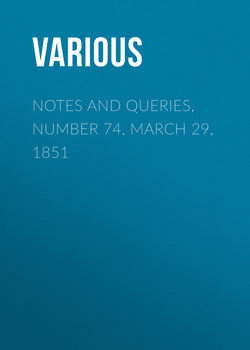Читать книгу Notes and Queries, Number 74, March 29, 1851 - Various - Страница 3
Notes
ILLUSTRATIONS OF CHAUCER, NO. II
ОглавлениеComplaint of Mars and Venus
I am not aware that the obvious astronomical allegory, which lurks in Chaucer's "Complaint of Mars and Venus," has been pointed out, or that any attempt has been made to explain it. In Tyrwhitt's slight notice of that poem, prefixed to his glossary, there is not the most remote hint that he perceived its astronomical significance, or that he looked upon it in any other light than "that it was intended to describe the situation of some two lovers under a veil of mystical allegory."
But, as I understand it, it plainly describes an astronomical conjunction of the planets Mars and Venus, in the last degree of Taurus, and on the 12th of April.
These three conditions are not likely to concur except at very rare intervals—it is possible they may have been only theoretical—but it is also possible that they may have really occurred under Chaucer's observation; it might therefore well repay the labour bestowed upon it if some person, possessed of time, patience, and the requisite tables, would calculate whether any conjunction, conforming in such particulars, did really take place within the latter half of the fourteenth century: if it was considered worth while to search out a described conjunction 2500 years before Christ, in order to test the credibility of Chinese records, it would surely be not less interesting to confirm the accuracy of Chaucer's astronomy, of his fondness for which, and of his desire to bring it forward on all possible occasions, he has given so many proofs in his writings.
The data to be gathered from the little poem in question are unfortunately neither very numerous nor very definite; but I think the following points are sufficiently plain.
1st. The entrance of Mars into the sign Taurus (domus Veneris), wherein an assignation has been made between him and Venus:
"That Mars shall enter as fast as he may glide,
In to her next palais to abide,
Walking his course 'till she had him ytake,
And he prayed her to hast her for his sake."
2nd. The nearly double velocity in apparent ecliptic motion of Venus as compared with Mars:
"Wherefore she spedded as fast in her way
Almost in one day as he did in tway."
3d. The conjunction:
"The great joy that was betwix hem two,
When they be mette, there may no long tell.
There is no more—but into bed they go."
4th. The entrance of the Sun into Taurus, as indicated in the unceremonious intrusion of Phebus into Venus' chamber; which, as though to confirm its identity with Taurus,
"Depainted was with white boles grete;"
whereupon Mars complains:
"This twelve dayes of April I endure
Through jelous Phebus this misaventure."
(It is scarcely necessary to remind the reader of Chaucer, that in the poet's time the Sun would enter Taurus on the 12th of April.)
"Now flieth Venus in to Ciclinius tour,
With void corse, for fear of Phebus light."
These two lines, so obscure at first sight, afford, when properly understood, the strongest confirmation of the astronomical meaning of the whole; while, by indicating the conjunction on the last degree of Taurus, they furnish a most essential element for its identification.
I confess that this "Ciclinius" gave me a good deal of trouble; but, taking as a guide the astronomical myth so evident throughout, I came to the conviction that "Ciclinius" is a corruption, and that Chaucer wrote, or intended to write, Cyllenius—a well-known epithet of Mercury, and used too in an astronomical sense by Virgil, "ignis cœli Cyllenius."
Now the sign Gemini is also "domus Mercurii;" so that when Venus fled into the tour of Cyllenius, she simply slipped into the next door to her own house of Taurus—leaving poor Mars behind to halt after her as he best might.
6th. Mars is almost stationary:
"He passeth but a sterre in daies two."
There still remain one or two baffling points in the description, one of which is the line—
"Fro Venus Valanus might this palais see,"
which I am convinced is corrupt: I have formed a guess as to its true meaning, but it is not as yet fully confirmed.
The other doubtful points are comprised in the following lines, which have every appearance of significance; and which, I have not the least doubt, bear as close application as those already explained: but, as yet, I must acknowledge an inability to understand the allusions. After Venus has entered Gemini—
"Within the gate she fled into a cave:
Dark was this cave and smoking as the hell;
Nat but two paas within the gate it stood,
A natural day in darke I let her dwell."
A. E. B.
Leeds, March 17.
